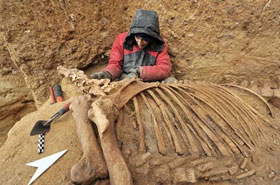
Prehistoric Horse Skeleton Unearthed in France
The full skeleton of a horse that lived in France 100,000 years ago has been discovered in the volcanic region of Auvergne, according to several French news sources including the French Press Agency (AFP).
The prehistoric animal's bones are in a “perfect state of preservation,” which makes this a truly “exceptional” find, said the AFP's source, Frédéric Surmely, curator of Auvergne's Regional Direction of Cultural Affairs (DRAC) archaeology department, which announced the discovery on Nov. 16. “The skeleton is complete, including the small bones and the caudal vertebrae (the tail bones).”
Farmer Jean-Charles Tixidre accidentally made the discovery Oct. 10 and immediately contacted the DRAC, the AFP reported. The horse's bones were about six feet underground in a field near the popular tourist site Puy-de-Dôme, an extinct volcano. Tixidre struck the horse's skull with his tractor when moving sand, according to La Montagne.
The first photos of the unearthed skeleton, released online Nov. 16, show a full set of whole bones still aligned in skeletal position. Probably an ancestor of the modern horse, this prehistoric mammal measured about 13.2 hands and “looks somewhat like a big pony,” Surmely said.
“(It) probably fell into a ravine, and its cadaver was quickly covered by falling mud or sliding earth, which would explain how it could be so well-preserved,” the AFP reported him as saying.
Paleontological studies are currently under way to determine a more precise age of the skeleton, according to the AFP. “We can estimate that it is at least 100,000 years old, perhaps much more,” Surmely said.
The discovery should help researchers better understand the evolution of the horse, the AFP reported.
